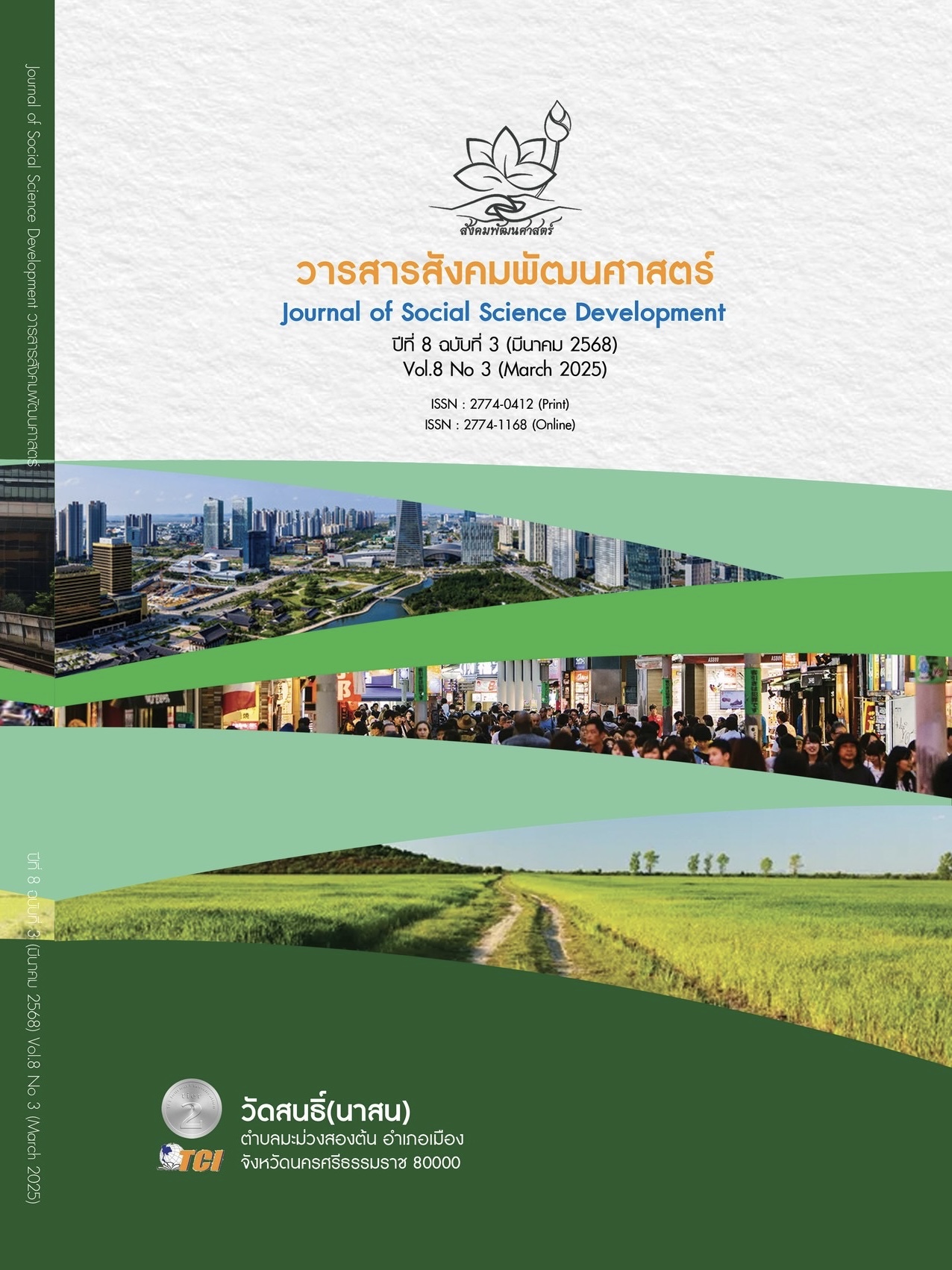EMPOWERING ORGANIZATIONS FOR A HAPPY WORKPLACE THROUGH CONTEMPLATIVE EDUCATION PROCESSES: A CASE STUDY OF THE CHILD DEVELOPMENT CENTER, BANG PHAE SUBDISTRICT MUNICIPALITY, BANG PAE DISTRICT, RATCHABURI PROVINCE
Main Article Content
Abstract
The purpose of this research is: 1) To study the needs for the development of early childhood development centers into community health-promoting organizations, 2) To develop a psychological education process to empower early childhood development centers as health-promoting organizations, and 3) To develop a guideline for empowering organizations to promote well-being in local communities. This is a mixed-methods study. The quantitative study sample consists of 368 individuals, including administrators and community members, selected using Krejcie and Morgan's table. The tool used is questionnaire, with a reliability of 0.98. For the qualitative study, key informants include administrators, staff, and community representatives, totaling 30 people, selected purposively. Data were synthesized through content analysis, verified using triangulation techniques, and presented descriptively. The results of the study found that: 1) the need for developing early childhood development centers into community health-promoting organizations was at a high level overall (= 4.44, S.D = 0.67), 2) the trial use of the psychological education process to empower early childhood development centers as health-promoting organizations showed a high level of effectiveness (
= 4.17, S.D = 0.60), and 3) the recommendations for enhancing the empowerment of health-promoting organizations at the local level revealed that using the psychological and cognitive education process to empower these organizations produced positive outcomes, especially in fostering mindfulness in decision-making and developing good relationships. It helped improve teamwork skills, promoted open-mindedness and listening, which led to better cooperation, reduced conflicts, and enhanced team collaboration. It also decreased stress and increased job satisfaction, ultimately leading to more efficient and sustainable public service delivery.
Article Details

This work is licensed under a Creative Commons Attribution-NonCommercial-NoDerivatives 4.0 International License.
References
ชาย โพธิสิตา. (2564). ศาสตร์และศิลป์การวิจัยเชิงคุณภาพ. (พิมพ์ครั้งที่ 9). กรุงเทพมหานคร: อมรินทร์พริ้นติ้งแอนด์พับลิชชิ่ง จำกัด.
ณฏฐพร สิงห์สร และคณะ. (2567). ความฉลาดทางอารมณ์วิถีพุทธ: การบูรณาการหลักธรรมสู่การเป็นองค์กรแห่งความสุขยุคพลิกผัน. วารสารมหาจุฬานาครทรรศน์, 11(1), 250-259.
ตัวแทนครู คนที่ 1. (17 ส.ค. 2566). การเสริมพลังองค์กรสร้างสุขด้วยกระบวนการจิตศึกษา : ศูนย์พัฒนาเด็กเล็ก เทศบาลตำบลบางแพ อำเภอบางแพ จังหวัดราชบุรี. (นิภาวรรณ เจริญลักษณ์, ผู้สัมภาษณ์)
ตัวแทนครู คนที่ 2. (17 ส.ค. 2566). การเสริมพลังองค์กรสร้างสุขด้วยกระบวนการจิตศึกษา : ศูนย์พัฒนาเด็กเล็ก เทศบาลตำบลบางแพ อำเภอบางแพ จังหวัดราชบุรี. (นิภาวรรณ เจริญลักษณ์, ผู้สัมภาษณ์)
ตัวแทนครู คนที่ 3. (17 ส.ค. 2566). การเสริมพลังองค์กรสร้างสุขด้วยกระบวนการจิตศึกษา : ศูนย์พัฒนาเด็กเล็ก เทศบาลตำบลบางแพ อำเภอบางแพ จังหวัดราชบุรี. (นิภาวรรณ เจริญลักษณ์, ผู้สัมภาษณ์)
ตัวแทนผู้บริหาร. (14 ส.ค. 2566). การเสริมพลังองค์กรสร้างสุขด้วยกระบวนการจิตศึกษา : ศูนย์พัฒนาเด็กเล็ก เทศบาลตำบลบางแพ อำเภอบางแพ จังหวัดราชบุรี. (นิภาวรรณ เจริญลักษณ์, ผู้สัมภาษณ์)
เทศบาลตำบลบางแพ. (2566). ข้อมูลพื้นฐานเทศบาลตำบลบางแพ. ราชบุรี: เทศบาลตำบลบางแพ.
ธัญญลักษณ์ ไพฑูรย์ และชำนาญ ปาณาวงษ์. (2565). การเปรียบเทียบการคิดเชิงบริหารจัดการทางสมองของนักเรียนระดับชั้นประถมศึกษาระหว่างโรงเรียนการเปลี่ยนแปลง เชิงระบบด้วยนวัตกรรมจิตศึกษา PBL และ PLC กับโรงเรียนทั่วไป. วารสารวิชาการและวิจัยสังคมศาสตร์, 17(1), 145-158.
บุญธรรม กิจปรีดาบริสุทธิ์. (2549). เทคนิคการสร้างเครื่องมือรวบรวมข้อมูลสำหรับการวิจัย. กรุงเทพมหานคร: จามจุรีโปรดักท์.
พรพรหมพรรณ บุญโคกล่าม และคณะ. (2566). ภาวะผู้นำของผู้บริหารสถานศึกษาสตรีที่ส่งผลต่อความสุขในการทำงาน ของครูและบุคลากรทางการศึกษา สังกัดสำนักงานเขตพื้นที่ การศึกษามัธยมศึกษาจันทบุรี ตราด. วารสารมหาจุฬานาครทรรศน์, 10(5), 142-152.
รวิวรรณ สุทธิสุวรรณ และคณะ. (2567). การศึกษาและวิเคราะห์การส่งเสริมกรอบคิดแบบเติบโตในการบริหารสถานศึกษา : กรณีศึกษาโรงเรียนทุ่งขนานวิทยา อำเภอสอยดาว จังหวัดจันทบุรี. วารสารมหาจุฬานาครทรรศน์, 11(3), 227-236.
เริงวิชญ์ นิลโคตร และคณะ. (2567). การจัดการความรู้และการเสริมพลังชุมชนแห่งการเรียนรู้บนฐานพุทธธรรม: มิติหลักสัปปุริสธรรม. วารสารวิจัยนวัตกรรมการศึกษาและเทคโนโลยี, 2(3), 1-11.
วิทยา เต่าสา และสุทธิษา สมนา. (2567). การพัฒนาคุณลักษณะความเป็นพี่เลี้ยงของนักศึกษาครูสังคมศึกษาด้วยกระบวนการจิตปัญญาศึกษา. วารสารราชนครินทร์, 21(2), 103-113.
ศิริชัย กาญจนวาสี. (2552). ทฤษฎีการทดสอบแบบดั้งเดิม. (พิมพ์ครั้งที่ 6). กรุงเทพมหานคร: โรงพิมพ์แห่งจุฬาลงกรณ์มหาวิทยาลัย.
Cronbach, L. J. (1990). Essentials of psychological testing. (5th ed.). New York: Harper Collins.
Deci, E. L. & Ryan, R. M. (2000). The "what" and "why" of goal pursuits: Human needs and the self-determination of behavior. Psychological Inquiry, 11(4), 227-268.
Krejcie, R. V. & Morgan, D. W. (1970). Detesrmining Sample Size for Research Activities. Educational and Psychological Measurement, 30(3), 607-610.
Likert, R. (1993). A Technique for the Measurement of Attitude. Chicago: Rand Mc Nally.


